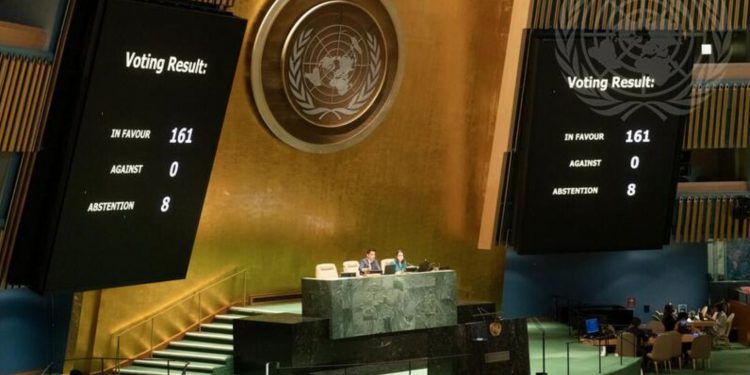A new resolution declares that everyone has the right to a healthy environment – a right that was not included in the Universal Declaration of Human Rights in 1948.
It’s been described as providing “more ammunition” to challenge policies and projects which are ecologically destructive, according to UN sources.
The resolution is not legally binding on the UN’s 193 Member States, however, it “sends a message that nobody can take nature, clean air and water, or a stable climate away from us – at least, not without a fight,” according to UN Environment Programme (UNEP) Executive Director Inger Andersen.
“The resolution demonstrates that countries are in solidarity with billions of people suffering under the weight of climate change, nature and biodiversity loss, and pollution and waste,” she adds.
“It will help people stand up for their right to a safe climate, their right to breathe clean air and their rights to access clean and safe water, adequate food, healthy ecosystems and non-toxic environments.
“Now we must build on this victory and implement the right. If nations implement this right fully, it will change so much.”
The resolution recognises that sustainable development contributes to human rights and that businesses have a role to play in respecting human rights.
“Voluntary human rights declarations can be instrumental in changing state policy”
It says, “environmental degradation, climate change, biodiversity loss, desertification and unsustainable development constitute some of the most pressing and serious threats to the ability of present and future generations to effectively enjoy all human rights.”
Joel E. Correia, Assistant Professor of Latin American Studies, University of Florida, said, “Resolutions like this have a history of laying the foundation for effective treaties and national laws.
“Voluntary human rights declarations can be instrumental in changing state policy and providing people with new political tools to demand better conditions.
“The human right to water adopted in 2010 is one of the strongest examples of how UN resolutions have been used to shape state policy. Diarrheal disease, largely from unsafe drinking water, kills half a million children under age five every year.
“Human rights advocates used the resolution to help pressure the Mexican government to reform its constitution and adopt a human right to water in 2012. While the concept still faces challenges, the idea of a right to water is also credited with transforming water access in marginalised communities in Bangladesh, Costa Rica, Egypt and other countries.”
“These resolutions empower ordinary people to hold their governments accountable”
The resolution on the right to a clean, healthy and sustainable environment was approved without dissent, though eight countries abstained: Belarus, Cambodia, China, Ethiopia, Iran, Kyrgyzstan, Russia and Syria.
UN Special Rapporteur on Human Rights and the Environment, David Boyd explained that some countries “have a very conservative perspective about human rights.”
Also, “countries that are major oil and gas producers perhaps have some fears about the implications of recognising this right.”
He added, “These resolutions may seem abstract, but they are a catalyst for action, and they empower ordinary people to hold their governments accountable in a way that is very powerful.”
The General Assembly resolution follows similar legal reforms at the international and national levels. In April, the UN Human Rights Council declared access to a “clean, healthy and sustainable environment” a human right.
“Last year 227 environmental defenders were killed”
Earlier this year, countries in Latin America and the Caribbean pledged more protections for environmental defenders, including indigenous peoples campaigning against logging, mining and oil exploration in protected areas.
In 2021, 227 environmental defenders were reportedly killed.
Last year, New York state passed a constitutional amendment guaranteeing citizens a right to a “healthful environment.”
In 2019, following a lawsuit by an environmental group, the Netherland’s top court ordered the Dutch Government to do more to cut carbon emissions, saying climate change was a direct threat to human rights.
And Brazil’s supreme court declared the Paris climate change agreement a human rights treaty, saying the pact should supersede national law.
Inger Andersen added, “The resolution was five decades in the making. From a foothold in the 1972 Stockholm Declaration, the right has been integrated into constitutions, national laws and regional agreements. In October 2021, it was recognized by the UN Human Rights Council. Today’s decision elevates the right to where it belongs: universal recognition.”























